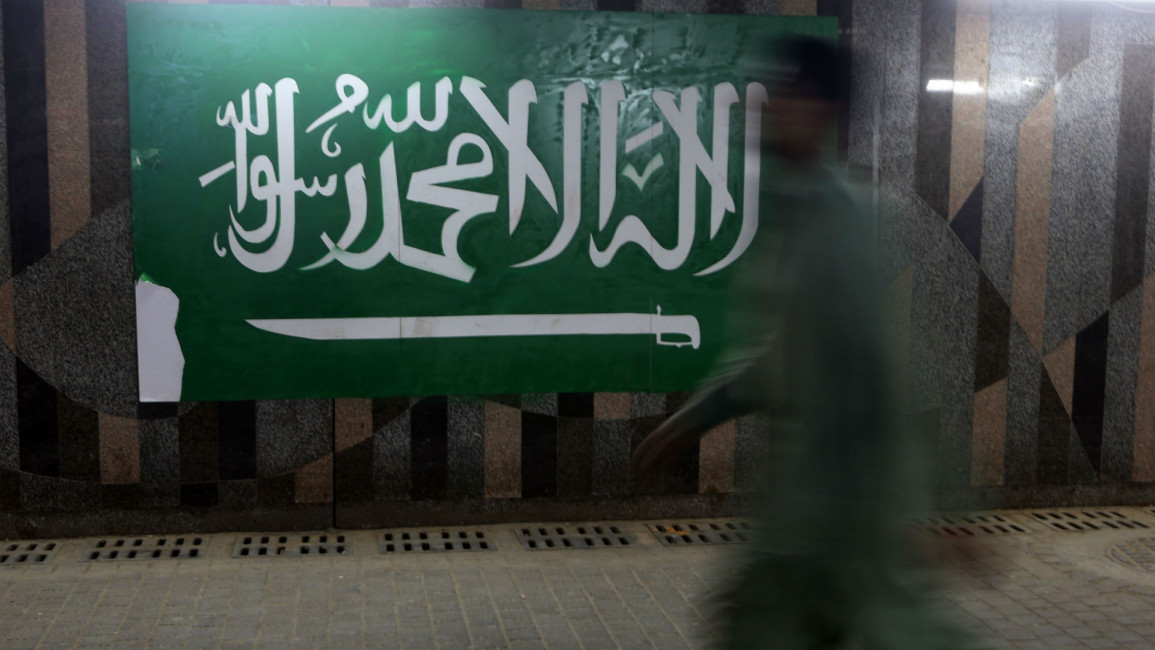
Saudi newspaper famous for peddling government propaganda decries 'BBC unprofessionalism'
Saudi newspaper famous for peddling government propaganda decries 'BBC unprofessionalism'
Okaz has been pushing 'fake news' at least since the start of the Qatar crisis, and has now turned on BBC Arabic.
2 min read
Saudi media outlets have led a smear campaign against Qatar [Getty]
Okaz, a Saudi newspaper known for its bombastic government propaganda since the start of the Qatar crisis, has lashed out against BBC Arabic over its critical coverage of Saudi affairs.
With no sense of irony, an editorial in the newspaper's website signed 'Okaz' said BBC Arabic was following in the footsteps of Qatar-based Al Jazeera, the media network whose independent coverage has infuriated Riyadh to the point of demanding its closure in return for lifting the blockade of Doha.
In recent months, independent Western and international media have taken a strongly critical tone vis-a-vis Saudi policies, as the recklessness of Mohammed bin Salman, the Saudi crown prince and de-facto ruler, leads his kingdom from failure to failure.
In Yemen, the war he has masterminded has failed to defeat the Iranian-backed Houthi rebels, but has killed thousands of civilians and triggered one of the world's worst humanitarian crises.
His blockade of Qatar has failed to achieve its objectives and even backfired, exposing his government's bullying tactics against friend and foe.
At home, his economic and social reform agenda has metamorphed into a shakedown and a crackdown on businesses, activists and clerics.
Meanwhile, the BBC and other big-name Western publications have come under repeated attacks from repressive regimes and their media mouthpieces in the region, with the accusation of 'fake news' being used to justify a crackdown on independent journalism as well as dissent.
Saudi media outlets such as Okaz, Riyadh and Saudi Gazette have themselves been peddling fake news in the course of toeing their government's line against its rivals, triggering widespread censure and ridicule.
Since the start of the Qatar crisis, media outlets in the Saudi-led bloc have led a smear campaign against Qatar and prominent figures in the gas-rich emirate, while turning a blind eye to gross abuses at home.
With no sense of irony, an editorial in the newspaper's website signed 'Okaz' said BBC Arabic was following in the footsteps of Qatar-based Al Jazeera, the media network whose independent coverage has infuriated Riyadh to the point of demanding its closure in return for lifting the blockade of Doha.
In recent months, independent Western and international media have taken a strongly critical tone vis-a-vis Saudi policies, as the recklessness of Mohammed bin Salman, the Saudi crown prince and de-facto ruler, leads his kingdom from failure to failure.
In Yemen, the war he has masterminded has failed to defeat the Iranian-backed Houthi rebels, but has killed thousands of civilians and triggered one of the world's worst humanitarian crises.
His blockade of Qatar has failed to achieve its objectives and even backfired, exposing his government's bullying tactics against friend and foe.
|
At home, his economic and social reform agenda has metamorphed into a shakedown and a crackdown on businesses, activists and clerics.
Meanwhile, the BBC and other big-name Western publications have come under repeated attacks from repressive regimes and their media mouthpieces in the region, with the accusation of 'fake news' being used to justify a crackdown on independent journalism as well as dissent.
Saudi media outlets such as Okaz, Riyadh and Saudi Gazette have themselves been peddling fake news in the course of toeing their government's line against its rivals, triggering widespread censure and ridicule.
Since the start of the Qatar crisis, media outlets in the Saudi-led bloc have led a smear campaign against Qatar and prominent figures in the gas-rich emirate, while turning a blind eye to gross abuses at home.




